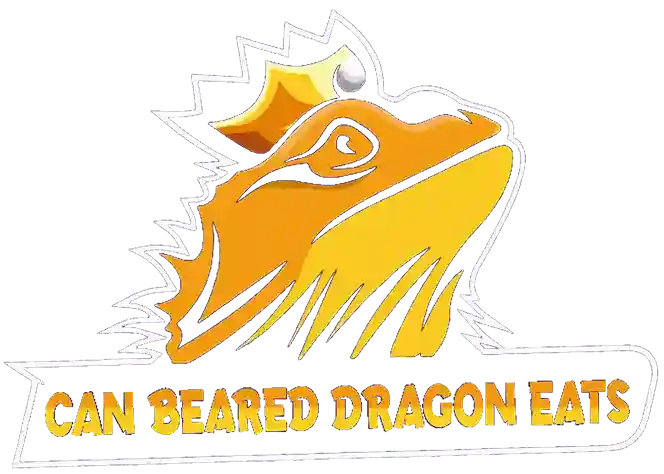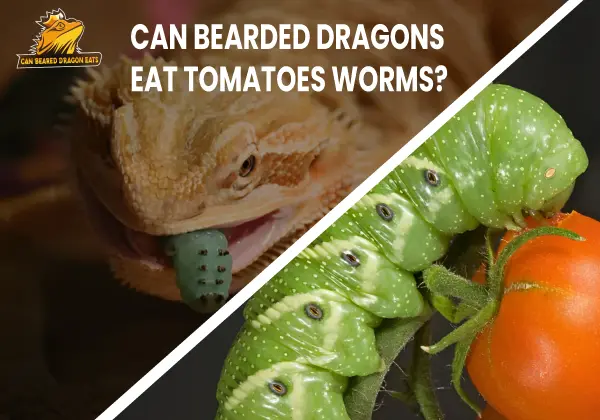Can Bearded Dragons Eat Tomato Worms?
Do you want to keep your pet healthy and happy? Then you must know what to feed them and what to avoid. One common question that comes to mind is, “Can Bearded Dragons eat tomato worms?” The answer is yes, but only in moderation.
Tomatoes are acidic and have an imbalanced calcium-phosphorus ratio, which can cause health problems if overfed. However, tomatoes are also rich in micronutrients and minerals, making them nutritious for your dragon’s diet. It’s essential to be mindful of your pet’s dietary needs, as their digestive system is unique and sensitive.
Regarding protein, hornworms are an excellent option for your bearded dragon. These insects are packed with calcium, water content, and protein, making them ideal for your dragon’s diet just like red worms and wax worms. Keep reading to learn more about feeding your bearded dragon hornworms and other nutritional tips for your pet’s well-being.
Read more : Can Bearded Dragons Eat Broccoli Leaves?
What are Tomato Worms?
Tomato worms, also known as tomato hornworms, are the larvae of the hawk or sphinx moth. These caterpillars are often found feeding on tomato plants, hence their name. They can range in size from one to four inches and have a bright green color with white stripes.
Are Hornworms a Staple for Bearded Dragons?
Tomato worms, also known as tomato hornworms, are the larvae of the Manduca quinquemaculata moth. While they are not a common food source, they are consumed in some cultures as a traditional delicacy.
Here are some potential nutritional benefits of tomato worms:
High in Protein
Tomato worms are a rich source of protein, containing up to 20% of their dry weight in protein. Protein is essential for building and repairing tissues in the body. Consuming protein-rich foods like tomato worms can help maintain muscle mass and promote wound healing.
Moderate in Fat
Tomato worms also contain a moderate amount of fat, which is important for providing energy to the body. Fat is also necessary for the absorption of certain vitamins, like vitamin A, which is essential for maintaining healthy vision.
Rich in Vitamins and Minerals
Tomato worms are a good source of several essential vitamins and minerals for maintaining good health. For example, they contain vitamin C, important for immune function, and vitamin B12, important for nerve function and red blood cell production. They are also a good source of iron, which is necessary for oxygen transport in the body, and calcium, which is important for bone health.
Contains Chitin
Tomato worms contain chitin, a complex carbohydrate that is indigestible by humans. Chitin has been shown to have potential health benefits, including boosting the immune system and improving gut health.
While tomato worms may not be a common food source in many parts of the world, they do offer some potential nutritional benefits.
Nutritional Value of Tomatoes Worms
According to Healthline, here is a table outlining the nutritional value of hornworms per 100 grams of raw weight:
| Nutrient | Amount |
| Carbohydrates | 5.9 g |
| Magnesium | 9 mg |
| Vitamin C | 15.1 mg |
| Phosphorus | 134 mg |
| Potassium | 260 mg |
| Calcium | 8.5 g |
| Fiber | 0.6 g |
| Protein | 22 mg |
| Calories | 77 kcal |
| Sodium | 10 mg |
| Iron | 1.2 mg |
| Fat | 3.1 g |
These values may vary slightly depending on the species and diet of the hornworm.
How to Incorporate Tomato Worms into Your Diet?
Hornworms are actually a nutritious source of protein and can be incorporated into your diet. Here’s how:
Harvesting and Cleaning.
To harvest tomato worms, simply pluck them off the tomato plant and place them in a container. Next, clean them thoroughly by rinsing them under running water and removing any dirt or debris.
Preparing
Once the tomato worms are cleaned, they can be cooked in a variety of ways. One popular method is to saute them in a pan with garlic and onions. They can also be grilled or baked.
Seasoning and Flavoring
Tomato worms have a mild flavor and can be seasoned with various herbs and spices to enhance their taste. Consider using chili powder, cumin, or smoked paprika.
Pairing
Tomato worms can be paired with other ingredients to create a well-balanced meal. Consider adding them to a stir-fry with vegetables or using them as a protein source in a salad.
What are the Disadvantages of Feeding Bearded Dragons Tomatoes?
Feeding bearded dragons a varied diet is important to maintain their health and well-being. While tomatoes may seem like a healthy addition to their diet, they come with some potential disadvantages that should be considered.
High Acidity Levels
Tomatoes are high in acidity, which can cause stomach upset and diarrhea in bearded dragons. This particularly concerns young or sick bearded dragons with weaker digestive systems. Additionally, the acidic nature of tomatoes can cause irritation and inflammation in their digestive system.
High Water Content
Tomatoes have a high water content, leading to diarrhea or dehydration if fed in excess. This is especially concerning bearded dragons housed in humid environments or have access to water sources.
High Sugar Content
Tomatoes are naturally sweet and contain a high amount of sugar. Ingesting too much sugar can lead to weight gain and metabolic disorders in bearded dragons.
Low Nutritional Value
While tomatoes contain some vitamins and minerals, they are not a particularly nutrient-dense food for bearded dragons. Some other vegetables and fruits offer a more balanced and nutritious diet for these reptiles.
Expert’s Tips On Feeding Tomatoes To Bearded Dragon
- Tomatoes can be served crudely, so you don’t need to stress over cooking them.
- Never give green tomatoes to bearded people; They have a chemical that is harmful.
- Bearded Dragons require a lot of calcium. Before serving the salad to your dragon, be sure to sprinkle it with a high-quality calcium supplement.
How Often Can Bearded Dragons Eat Tomato Worms?
Bearded dragons can eat tomatoes in moderation as part of a balanced diet that includes a variety of vegetables, fruits, and insects. However, tomatoes should not be a regular staple food for bearded dragons due to their high acidity and sugar content.
Feeding them tomatoes no more than once a week and in small amounts as a treat is recommended. It’s important to monitor your bearded dragon’s reaction to tomatoes and adjust the frequency and amount accordingly. As with any new food, it’s best to introduce it slowly and in small quantities to avoid any digestive upset or health issues.
How Do I Store My Bearded Dragon’s Hornworms?
Hornworms are a great source of nutrition for your bearded dragon, and it is important to store them correctly to keep them fresh and healthy for your pet. To store hornworms, use a ventilated container that is large enough to allow them to move around freely.
Line the container with paper towels to absorb any excess moisture and keep them at room temperature, away from direct sunlight. It is important to remove any uneaten hornworms after feeding to prevent contamination and to ensure your pet’s health.
Can You Cut Hornworms in Half?
While cutting hornworms in half may seem like a solution to feeding your pet smaller portions, it is not recommended.
Cutting hornworms can cause unnecessary stress and harm to the larvae, and it can also expose your pet to the bacteria and contaminants inside the hornworm’s digestive system. Feeding your pet appropriately sized hornworms based on their size and age is best to ensure their health and well-being.
How Do You Dispose of Hornworms?
If you have extra hornworms that your pet did not consume, it is important to dispose of them properly to prevent contamination and avoid causing harm to the environment. One option is to release them back into nature if they are native to your area and pose no threat to the ecosystem. However, if they are not native, they can become invasive and harm the ecosystem.
Another option is to place them in a plastic bag and freeze them for a few hours before discarding them in the trash. This ensures that they are no longer alive and do not pose any risk to other animals. Proper disposal of hornworms is essential to maintain a healthy environment for all living beings.
Can Baby Bearded Dragons Eat Tomatos Worm?
Baby bearded dragons should not be fed tomato worms or hornworms. These worms are too large for baby bearded dragons to consume and can cause digestive issues, including impaction. In addition, hornworms may have high levels of toxins if they have been feeding on toxic plants, which can be harmful to baby bearded dragons.
It’s best to feed baby bearded dragons appropriately sized insects, such as crickets or small mealworms. Vegetables and fruits should also be offered but may need to be chopped or grated to make them easier for young bearded dragons to consume.
How Long Do Hornworms Live?
Hornworms, which are the larval stage of the hawk moth, typically live for 4-6 weeks as adults. As larvae, their lifespan can vary depending on environmental conditions and food availability. Hornworms can be kept as reptile feeders and in a clean, appropriately sized container with fresh food and water.
If you are keeping hornworms as feeders, keeping them at the correct temperature and humidity levels is important. Refrigerating hornworms can slow their growth and extend their lifespan for several days. However, they should be used as soon as possible to ensure they are still nutritious for your reptile.
Read more : Can bearded dragons eat collard greens?
Final Thought For Can Bearded Dragons Eat Tomato Worms?
As part of your bearded dragon’s diet, hornworms can be a great way to ensure they receive the necessary nutrients for optimal health. These insects provide high-quality protein, calcium, and hydration that are essential for bearded dragons to thrive. While some owners may be hesitant to handle hornworms, it’s important to remember that they can be a tasty and nutritious treat for your beardie.
Feeding your bearded dragon hornworms three times a week in addition to other insects, vegetables, and fruits is recommended. As always, monitoring your bearded dragon’s diet and adjusting it to ensure they receive a balanced and healthy diet is important. Your bearded dragon can lead a happy and fulfilling life with the proper care and nutrition.
- Eastern Bearded Dragon - July 26, 2024
- Why Do Bearded Dragons Bob Their Heads? - July 25, 2024
- Everything You Need to Know About Paradox Bearded Dragons - July 10, 2024

